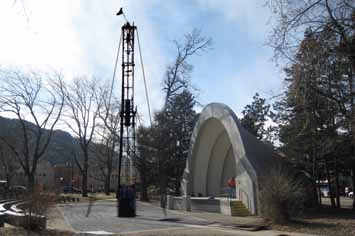Fracking the Boulder Bandshell by j dial
Without a doubt one of the most persuasive arguments against
fracking, not just in the west but on the planet, is its promiscuous wastage of
water, water that virtually goes away, never to be of use again. What if someone came up with a way to frack
without water?
Someone has. LPG
(liquefied propane gas) fracking uses in place of water a thick gel made from
propane like that which feeds your gas barbeque. A research
engineer critical of fracking's use of vast amounts of water came up with the concept. Propane fracking is alive in Canada where the
inventor, Robert
Lestz, has joined the company GasFrac.
While awaiting a US patent the technique has been tested
in such states as Texas, Pennsylvania, Oklahoma, New Mexico, and Colorado.
The gel is used like water and has the same effect, pumped underground at
pressure with the proppant within it holding open cracks in shale from which
natural gas emerges.
Underground pressure and heat convert the gel to vapor and
with the gas it returns to the surface, where it is collected and separated. The propane vapor can be re-gelled and
reused. Unlike water, propane gas does not ferry drilling
chemicals, radioactive water, and other unsavories back to the surface with
it. And with LPG fracking, another knotty problem with water-based
fracking--shiploads of wastewater--goes away.
Fracking with propane was attempted back in the 70s. At that time the gel was mixed with sand in something
like a blender. Exposed to air, the propane tended to 'boil' into vapors. A
closed-loop system developed by GasFrac now keeps the gel unsublimated.
When water is used in fracking it can block
the cracks through which natural gas is collected. This can't happen with propane. And less is needed. According to Lestz, one gallon of propane is
used for every five gallons of water. With water-free
fracking, more natural gas is milked from the
tiny pockets in which it accumulates. Without water to block tiny passages, propane accesses more natural gas. And compared to 'regular' fracking only
about one-quarter of the number of truck trips are required.
With water-free fracking, have we at last found
a way to have our gas and burn it too?
Avoiding the virtual destruction of water is a huge plus. So are lack of wastewater and fewer 'thumper trucks'. But before we pop the cork we might consider more factors.
Propane is flammable, and a lot of it is needed. In 2011, a flash
fire at a GasFrac site in Alberta injured 13 people. Since then, during drilling no one can be within
the 'hot
zone', which is 50 meters or about 150 feet from the wellhead. The equipment is operated from
afar. Over 20 sensors monitor for
vapors, and closed-circuit televisions and infrared cameras seek temperature
changes that might imply a propane leak.
Pressure sensors identify failures.
Expense is an issue.
Despite the fact that it can be reused, propane
costs more than water. The technology is
proprietary and will have limited availability; costs will be consonant with
demand. Infrastructure
is also a factor for propane delivery.
Leaking gas is an issue. Proponents claim that with propane fracking one-hundred percent of the once-gelled vapor is reclaimed and maybe that is so. But methane leakage from fracking sites is increasingly recognized as onerous. Annually, about three trillion cubic feet of methane leak from drill sites into the atmosphere. That's as much warming power as arises each year from about half of this country's coal-burning plants. The major culprits are Russia and the US; on this, China still lags. That three-billion-cubic-feet figure, by the way, is an estimate that is probably low. Thus far regulators have 'encouraged' companies to seek and cap methane emissions from oil and gas wells, pipelines, and tanks, but the industry, citing cost and complexity in inspecting some 700,000 wells, is largely recalcitrant. Will propane drilling be so different?
Sadly, we are addicted and nothing is safe. We drain the easy sources of oil and gas and only drill more
deeply and widely. We seek to extract every cubic millimeter. We scrape ancient forests from bituminous sands; we blow the tops off mountains. The ice sheets melt from global warming, so we
race to get more hydrocarbons to pump into the air. We are so eager for the unveiling of virgin
territory to exploit that you can hear the heavy breathing.
Every time we chase the tail of another fossil-fuel energy chimera we delay that
much longer any serious quest for sustainable energy solutions. Do we really believe that we can have our earth
and burn it too?
***
Past articles on fracking: Everything You Always Wanted to Know About Fracking But Should Be Afraid to Ask--An Overview; Fracking: Water Issues--Colorado-centric, But Applicable to All; Who the Frack's Really in Charge? (on regulation).
(Note: You can view every article as one long page if you sign up as an Advocate Member, or higher).






